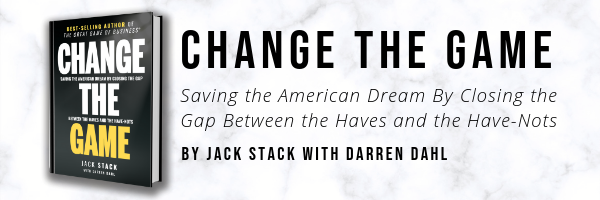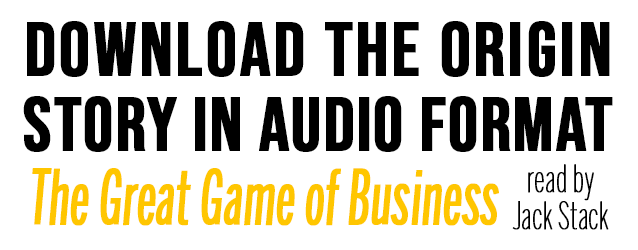
How often have you heard this: “All we ask you is to do the job, nothing more.” Well, I don’t want people just to do a job. I want them to have a purpose in what the hell they’re doing. I want them to be going somewhere. I want them to be excited about getting up in the morning, to look forward to what they’re going to do that day. Maybe it’s a matter of tricking people into wanting to come to work. I say “tricking” because I don’t think it’s a natural thing. Most people would rather be doing something other than work—I certainly would—but they feel they don’t have any choice.
Companies reinforce that feeling. They not only tell people just to do the job, they set up the work so it is just a job. They say, “Drill as many of these holes as possible, as fast as possible, and don’t think about anything else.” That’s one way to run a company. What you wind up with are workers who think a job is just a job. I call them the living dead.
I want to get rid of the living dead. I can’t stand going into factories and businesses and seeing these faceless people standing around. They don’t look healthy, and they don’t act healthy, and they’re a big problem for corporate America. I’m talking about the people who are there because it’s a job, whose attitude is, “I have to be here, but I don’t have to like it. I’ll do it for my family, not for myself.” What have we done to create those types of environments? We should be able to tell this person, “It’s your obligation to be happy. Find somewhere to be happy. Don’t sit around me and be miserable.” Then we wonder why we have productivity problems. You can’t have high productivity with faceless people. They’re not happy with themselves, they’re not happy with their jobs, and they bring you down.
On the other hand, you can’t really blame them for feeling that way about their work when they’re constantly being told to just do the job, nothing more. Why would anybody think a job was more than a job when that’s all the company expects it to be? But if you set up the work to be a step on the path to something else, then it takes on a new meaning. It becomes more than just a job.
.png?width=1800&name=quote(do_away_with_jobs).png)
To do that, you have to get people to dream. You have to show them that there really are pots at the end of the rainbow, and you can get your pot if you want it and are willing to work for it. Business is a tool for achieving your highest dreams—your financial dreams, that is. Obviously there are some dreams business can’t help with. It can’t restore a person’s health. It can’t endow you with artistic talent. But it can help most people to achieve some success in life. It can give people hope. Once you understand the Game, you can take it as far as you want to. The only thing that holds a lot of people back, I think, is that they don’t put the highway out in front of them. They limit themselves. We continually challenge people to tell us where they want to go, and what they want to do with their lives. When you do that, you open a lot of doors. You get rid of a lot of the frustrations people have. You also take their excuses away, which is essential.
To be sure, some jobs are bad, demeaning—the kind of job nobody wants to do. We had a job that involved cleaning certain parts with chemicals. There was a cleaning tank, and someone had to stand there all the time in a splash-proof raincoat and rainpants, even when it was 90 degrees outside. Nobody wanted the job, so we took a tip from the Japanese: we got rid of it. We said, “Let’s robotize the jobs people don’t want, let’s computerize them, let’s get them out of the market.” But once you’ve done that, once you’ve gotten rid of the worst jobs, then what? There are still a lot of jobs in this world that involve putting washers on bolts. You can’t walk away from it. The work is boring, but it has to be done.
The Game is an attempt to create an environment wherein everybody can take pleasure in their work, even the people who put washers on bolts. They can be doing something else at the same time. What we’re trying to do is to take people beyond the job, to give them the opportunity to use their intelligence and achieve something. In effect, you steal a little bit of someone’s brain while she’s applying the manual effort. You get in there, and you turn on a light, and you create a stimulation. She may be putting washers on bolts, but at the same time she’s thinking about ways of making her environment better, her position better, her life better. She’s not just making a contribution to an end product. She’s making a contribution to her own life. She’s moving in a positive direction. She’s going somewhere.
Excerpted from The Great Game of Business.
The original Great Game of Business book started it all, but now's your chance to order Jack Stack's latest book, Change the Game. The newest addition to the Great Game book collection is for those that truly want to transform lives for the better and give people the opportunity to build better lives for themselves, their families, and their communities. Order your copy now to see how businesses can empower people to pursue their dreams and benefit our society as a whole.
-
As a Leader, Are You Living Up to Your End of the Employment Bargain?
-
Is Your Team Ready for Open-Books? Take This Leadership Quiz
.png)



.jpg)








.png)


